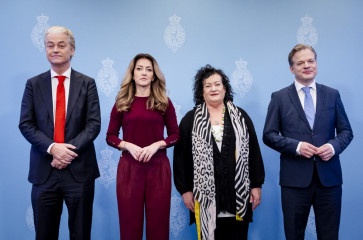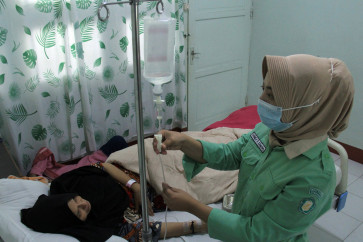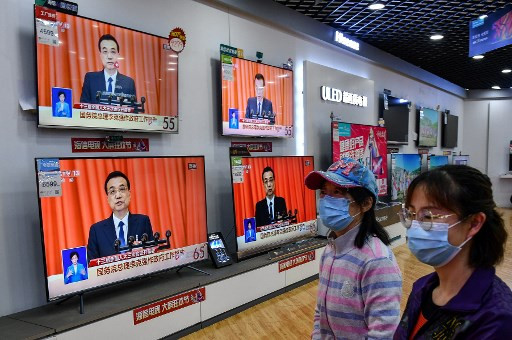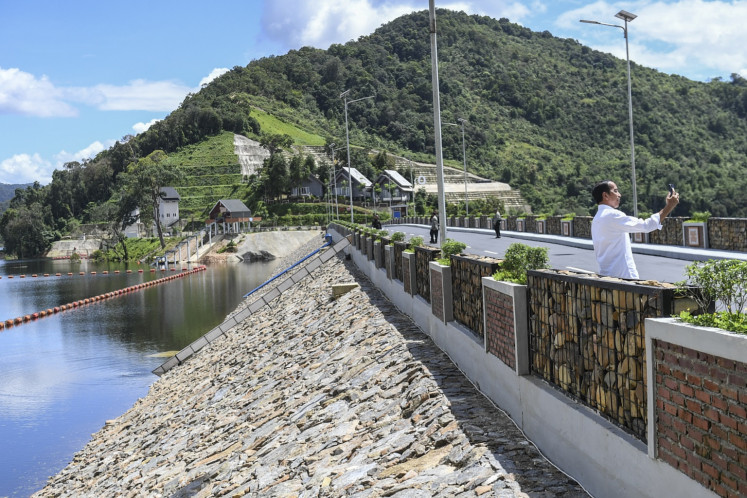Party-linked ministers disburse trillions in unaudited ‘social aid’
“A politician who portrays himself as caring and sensitive because he wants to expand the government’s charitable programs is merely saying that he’s willing to try to do good with other people’s money
Change Size

“A politician who portrays himself as caring and sensitive because he wants to expand the government’s charitable programs is merely saying that he’s willing to try to do good with other people’s money. Well, who isn’t?”
The US political satirist and journalist P.J. O’Rourke says it well: pork-barrel politics is inevitable. In Indonesia — where vote-buying is virtually business as usual during elections — the practice is so plausible that some parties might see it as the norm.
The Social Welfare Law, enacted in 2009, has made it possible for every ministry to launch social aid programs. It defines social aid as the distribution of funds or goods to individuals, families or groups of people to help address social ills.
As the law does not provide guidelines as to how the programs should be implemented, ministries have set their own distribution mechanisms and criteria of recipients. This, critics say, often leads to misuse of state funds, if not outright graft.
“State bodies tend to define ‘social aid’ broadly. As a result, many ministries, including those having little to do with social affairs like the Youth and Sports Ministry as well as Culture and Tourism Ministries, allocate some portion of their budget for programs they claim are aimed for social purposes,” Uchok Sky Khadafi of the Indonesian Forum for Budget Transparency (Fitra) said. “Sometimes we found that the programs were not really ‘social’.”
The Supreme Audit Agency’s (BPK) 2011 audit shows that at least eight ministries failed to provide full accountability for their social aid programs in 2010. The eight ministries’ total 2010 allocation for social aid was Rp 56.78 trillion (US$6.42 billion). As much as Rp 2.79 trillion or 4.91 percent was mismanaged and lacking accountability, according to the BPK.
The Youth and Sports Ministry, which has been under public scrutiny for alleged corruption in the SEA Games’ athlete-village project and the sports-education center in Hambalang, West Java, allocated almost half of its Rp 2.5 trillion 2010 budget for social aid programs.
Minister Andi Mallarangeng of the Democratic Party approved the block-grant programs which led to the disbursement of Rp 1.06 trillion (87.6 percent of the ministry’s total social aid funds) to 1,155 recipients with activities in the youth and sports sector.
The BPK states that accountability reports on the use of Rp 405.95 billion (38.3 percent) of block-grant funds received by 556 recipients were absent and the funds may have been misused due to the ministry’s lack of transparency and inadequate monitoring. The audit agency also found poor accountability in the management of Rp 7.69 billion of aid for the International Olympic Committee (KOI) and Rp 5.1 billion for the Indonesian Sports Council (KONI).
Some ministries kept social aid funds with third-party institutions, such as banks, for months without clear reasons. Uchok said officials might have intentionally deposited the money to reap the interest.
The Disadvantaged Regions Ministry, for example, failed to disburse Rp 93 billion of social aid funds it deposited in a bank. The ministry is headed by Helmy Faisal Zaini, a politician from the National Awakening Party (PKB).
Religious Affairs Minister Suryadharma Ali of the United Development Party (PPP) approved the allocation of Rp 8.12 trillion (26.51 percent of the ministry’s total budget of Rp 30.63 trillion) to social aid programs. Most of the funds, amounting to Rp 7.88 trillion, financed so-called “education institution assistance funds” which, according to the BPK, lacked clear procedures for verifying eligible recipients.
Lawmaker Eva Kusuma Sundari of the opposition Indonesian Democratic Party of Struggle (PDI-P), also a member of the House of Representatives’ State Financial Accountability Committee, said President Yudhoyono’s administrations failed to implement performance-based policies. “Every penny of taxpayers’ funds must be accounted for on the basis of results,” she said, adding that the government should limit the allocation of social aid funds in each ministry.
__________________________________________________________________________________________
Letter to the editor: Health Ministry clarifies
The Jakarta Post,
Health Ministry clarifies
With regard to the report titled "Party-linked ministers disburse
trillions in unaudited social aid", published in The Jakarta Post on
Dec. 1, 2011, we would like to provide the following clarification.
Social Aid (Bansos) takes the form of transfers of money or goods by
the central government/regional administration to society for
protection from potential social risks. It can be directly given to the
public and/or social institutions, including nongovernmental
organizations engaged in educational and religious activities. This
expenditure, aiming at promoting public welfare, is not continuously
provided and is selective.
In 2010, the spending of Bansos in the Health Ministry was meant to
enhance health service access and equity through promotional and
preventive operations in public health centers, or Puskesmas, (BOK) as
well as curative and rehabilitative activities in Puskesmas and
hospitals (Jamkesmas). The ministry also boosted the role of society
through Community Based Health Efforts by forming village health
stations to enable problem identification, problem solution and
emergency handling.
The disbursement of BOK funds in 2010 used the mechanism of Bansos
due to the absence of the right mechanism for the distribution of BOK
funds to Puskesmas.
As for the fund's Rp 35.18 billion that was not spent and refunded
to the state, it was allocated for Puskesmas health services that were
not yet optimally utilized. The fund was also an accumulation of the
Jamkesmas leftover fund of previous years. Pursuant to the relevant law,
any remaining funds in the current fiscal year are to be refunded to
the state with interest and will be reallocated in the following year.
Murti Utami
Secretariat General Health Ministry
Jakarta
Thank you for your clarification.
-- Editor









